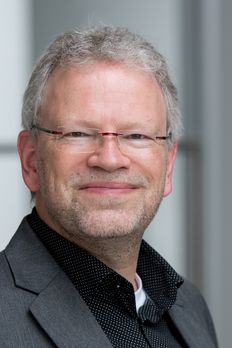Prof. Dr. Martin Fränzle
Prof. Dr. Martin Fränzle
Prof. Dr. Martin Fränzle
Carl von Ossietzky Universität Oldenburg
FK II - Department of Computing Science
Research Group Foundations and Applications of
Systems of Cyber-Physical Systems
Escherweg 2
D - 26121 Oldenburg
Office: OFFIS - D 119/120
Tel.: + 49 441 9722 500
Fax: + 49 441 9722 502
E-Mail:
Curriculum Vitae
Education
| 1983-1991: | Diploma Studies in Informatics, Mathematics, and Logics at the Christian-Albrechts-Universität Kiel, Germany; at the same time apprenticeship and service as a paramedic in the ambulance and rescue services |
| 1997: | Doctoral degree from the Technical Faculty of the Christian-Albrechts-Universität Kiel, Germany (best-dissertation award) |
Employment
| 1989-1991: | Student Researcher at the Department of Informatics of the Christian-Albrechts-Universität Kiel, Germany |
| 1991-1997: | Research assistant at the Institute of Informatics of the Christian-Albrechts-Universität Kiel, Germany |
| 1997-2000: | Post-doctoral researcher at the Department of Computing Science of the Carl von Ossietzky Universität Oldenburg, Germany |
| 2000-2002: | German equivalent to an assistant professor (German C1 scale) a the Department of Computing Science at the Carl von Ossietzky Universität Oldenburg, Germany) |
| 2002-2004: | Associate Professor in Computer Science and Engineering at the Department of Informatics and Mathematical Modelling at the Technical University of Denmark, Kgs. Kyngby, Denmark |
| 03-04/2002: | Visiting Professor at Tallinn University of Technology, Estland |
| 2004-03/2022: | Professor at the Department of Computing Science at the Carl von Ossietzky Universität Oldenburg, Germany; head of research group "Hybrid Systems" |
| 2004-2015: | Member of the board and project area coordinator within the transregional research center SFB-Transregio 14 "Automatic Verification and Analysis of Complex Systems" (AVACS) for project area Hybrid Systems |
| 2004-2019: | Member of the board of the Interdisciplinary Research Center Safety-Critical Systems at the University of Oldenburg, Germany |
| 2006-2008: | Velux Visiting Professor at the Technical University of Denmark, Kgs. Lyngby, Denmark |
| since 2011: | regular visits to the Chinese Academy of Sciences |
| 2012-2021: | Co-speaker of the DRG-fundet Research Training Group SCARE (System Correctness under Adverse Conditions) |
| 2013-2015: | Dean of the School of Computing Science, Business Administration, Economics, and Law at the Carl von Ossietzky Universität Oldenburg, Germany |
| 2016-2017: | Visiting Professor at Oxford University |
| 2018-2021: | Chairman for the executive board of the R&D division Transportation at the affiliated research institute OFFIS e.V. |
| 2020-2021: | Vice President for Research, Transfer and Digitalization of the Carl von Ossietzky Universität Oldenburg, Germany |
| since 04/2022: | Professor at the Department of Computing Science at the Carl von Ossietzky Universität Oldenburg, Germany; head of research group Foundations and Applications of Systems of Cyber-Physical-Systems |
A comprehensive CV is available from here.
Research Interests
M. Fränzle’s research interests are in modelling, verification, and synthesis of reactive, real-time, and hybrid dynamics in embedded and cyber-physical systems. He has worked on the semantics of high-level modelling and specification languages and on decision problems and their application to verifying and synthesizing real-time and hybrid discrete-continuous systems including settings subject to stochastic disturbances. The complexity barrier rapidly hit by such automated verification and synthesis procedures has been attacked through extending bounded model checking to very expressive temporal logics, branching-time abstractions, and by developing SAT-modulo-theory techniques for arithmetic constraint solving and tailoring them to the specific formulae structures arising in different verification domains and in synthesis. Furthermore, SAT-modulo-theory techniques for arithmetic constraint solving have been extended to the undecidable domain of arithmetic constraints involving transcendental functions and ordinary differential equations as well as to stochastic variants facilitating the fully symbolic analysis of probabilistic hybrid systems. Another major line of research deals with robust notions of system correctness, i.e. with the construction of correctness certificates which remain valid under the ubiquitous kinds of disturbances like, e.g., manufacturing tolerances or incomplete information. Fundamental research on these topics has mostly been pursued within large collaborative research projects, like the Transregional Collaborative Research Center SFB-TR 14 AVACS (Automatic Verification and Analysis of Complex Systems) or recently the Research Training Group DFG GRK 1765 SCARE (System Correctness under Adverse Conditions).
Applied research within, a.o., the recent projects IMoST (Integrated Modelling for Safe Transportation), SaLsA (Sichere autonome Logistik- und Tranportfahrzeuge im Außenbereich), and MoVeS (Modeling, Verification and Control of Complex Systems), as well as within two industrial research contracts with DENSO Automotive and Volkswagen addresses industrial application domains, which range from advanced driver assistance systems (IMoST) via self-driving transportation systems (SaLsA) to demand-response schemes in power supply networks (MoVeS). These lines of applied research are now extended within the Interdisciplinary Research Center Critical Systems Engineering for Socio-Technical Systems, where the safety impact of operator assistance both for maritime and road-bound transportation is investigated in cooperation with the pertinent industry within dedicated living labs.
A recorded talk explaining some of my research interests can be found here.
Publications
Most of my recent publications can be found in the AVACS publications database or, if not AVACS-related, on the group's own page.
An (at least almost, perhaps missing recent additions) complete list is available from here.


